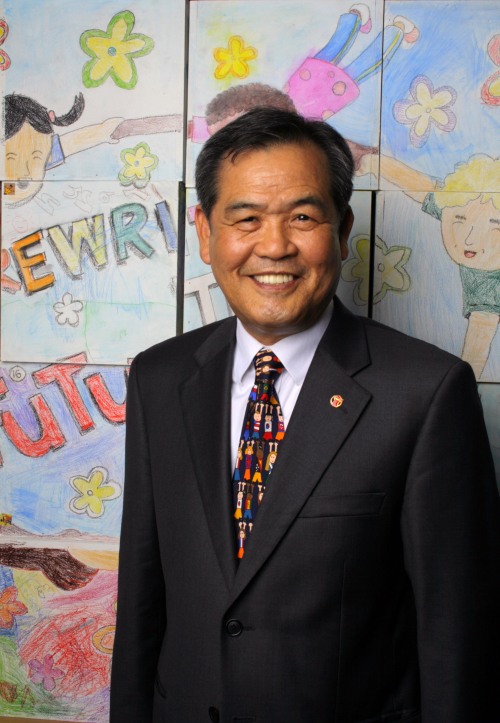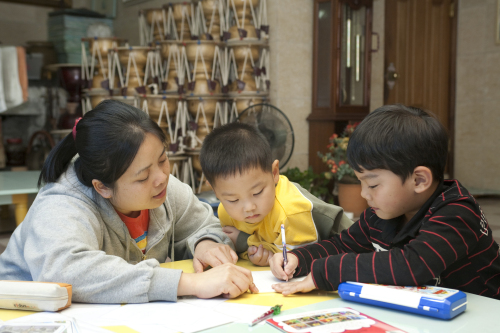Charity aims to improve young people’s rights and end child abuse
Most kids in South Korea no longer lack food or shelter. But too many of them lack another necessity, according to Save the Children Korea president Kim No-bo ― they are missing a voice.
By this, he means the ability for kids here to speak out in their own interest.
“My greatest concern is on child abuse,” he said. “The major issue is that parents aren’t likely to be divested of or limited in their parental rights even if they abuse their child.”
Most kids in South Korea no longer lack food or shelter. But too many of them lack another necessity, according to Save the Children Korea president Kim No-bo ― they are missing a voice.
By this, he means the ability for kids here to speak out in their own interest.
“My greatest concern is on child abuse,” he said. “The major issue is that parents aren’t likely to be divested of or limited in their parental rights even if they abuse their child.”

The charity recently filed a petition to the Korean government calling for stronger penalties for violence against children, but is still waiting for lawmakers to move on their suggestions.
Also, Kim strongly believes that Korea’s outlawing of corporal punishment for children should be extended to other punishments that indirectly cause children pain. Under his watch, disciplinary techniques that cause discomfort such as making kids do pushups or stand holding heavy objects for long spells would also be outlawed from schools.
“Legally, indirect corporal punishment is still accepted. That also should not be allowed,” he said.
“Nobody should be able to carry out corporal punishment, not even parents.”
He said there were many alternative ways of keeping discipline in schools ― a reason many teachers have given when advocating indirect corporal punishment.
He suggested temporarily confiscating naughty children’s mobile phones as a more humane means of discipline.
“This is just one way,” he said. “I think there could be a lot of alternative ways to control discipline in classes without using indirect corporal punishment.”
Rather than physically reprimanding children into submission, Kim said Koreans should be thinking about how to best help kids grow.
Let kids develop
“Currently, we are facing issues of child development and participation. Children are suffering from the burden of excessive education.
“They do not have any time to play with their friends. They are forced to study day and night. It is a really serious issue and we have to find a better way for them to learn.”
Kim thought teachers should be moving towards developing kids’ analytical skills rather than having them focus on rote learning and cramming information.
“There are many teachers simply teach memorizing things that is not the way the children should be taught,” Kim added, saying that another key area was encouraging children’s participation.
“Traditionally, Korea always accepted leadership in society but this can see children neglected socially.
“When we talk about some of the children’s activities or some meal for the children I think that the children’s opinions should be reflected we should respect their opinions. We need them to participate to decide some of their own affairs. Participation is a serious new area that we have to work on.”
Save the Children is currently holding sessions in schools and kindergartens to teach them about their rights and to encourage them to voice their opinions.
“For the children the whole idea is new and they are not familiar with this kind of motivation.
“But they immediately change their way of thinking, they were actively expressing their opinion. The change was quite fast and favorable.”
One unexpected area where Save the Children Korea is helping kids find a voice is in second languages. Realizing that kids of multicultural marriages here were at a disadvantage, the charity has devised courses to help children learn their non-native mother’s tongues.

Speaking in many tongues
“Children who come from multicultural families often face harassment, so regarding language we really pay attention to the language of the mother,” Kim said.
“The children can speak Korean very well but the mothers may be poor at speaking Korean. It is more difficult for mothers to learn Korean than it is for children to learn the mothers’ tongue. That is why we teach the children their mothers’ native language.”
Save the Children is providing multilingual education programs and textbooks to help children learn Vietnamese, Chinese or Mongolian according to the mother’s language.
“It is important for a child to be able to use the mother’s native language as interaction between mother and child plays a huge role in children’s development.
“Moreover, it is one more foreign language for the kids, which is a good way for Korea to become a global society in the future.”
While Kim views such multiculturalism as a positive, he recognizes that there are still barriers to integration here.
“I would say that there is still prejudice against foreigners,” he said.
“Traditionally we have no experience with people of different colors and different languages so to live with multicultural families is new for us.”
The charity spends 467,380,000 won on multicultural development annually, which includes language programs, mentoring and even medical care.
But it is not just children from multicultural families that need extra help. Kim is also concerned about children “in the most vulnerable situations,” a group he takes to include those with only one parent or those where both parents have a job.
“In those cases the kids can be home alone doing almost everything for themselves ― living, eating, studying everything.”
The charity offers a range of support for such kids ― ranging from extracurricular programs to psychological treatments. For example for those kids who become too dependent on computer games. Therapies through painting or playing different kinds of game are available.
Even so, addiction to computer games seems a small worry compared to the issues faced by children in the developing world that Save the Children Korea is directing an increasing amount of its funds towards.
The charity’s current Everyone campaign focuses on the UN’s millennium development goal to drastically reduce child mortality by the year 2015. Currently 8 million children in the world die before they are 5 years old every year.
“The progress of this area is very slow, so Save the Children is focusing to improve child mortality in developing countries,” said Kim.
The charity’s is trying to encourage rich nations’ governments to invest in developing countries’ health infrastructure.
Advocating change
Kim added: “If we want to have health workers in every town in underdeveloped countries we need about 300,000 health workers. If we succeed to train and dispatch these health workers then the infant mortality rate will be cut significantly.
“Now we are pushing the governments to provide more money to support the children in under-developed countries.”
Although Korea was once a country needing such help from Save the Children international itself, the charity’s role here has changed dramatically from when it first started helping orphans in war-torn South Korea in 1953.
Now, the Korean branch of the organization takes no money from abroad and divides the around 35 billion won cash it raises annually here 50-50 between domestic and international projects.
And if North Korea is included in the charity’s international budget its work abroad could account for up to 80 percent of its budget in years to come.
“Along with South Korea’s economic growth and development it is natural to start helping others since we were grown through their support in the past,” Kim said.
“Once our economic power has grown up it is our duty to give back some of the help we have received. I think we now have the capacity to do that. I think it is natural to turn around at this moment from receiver to donor.”
By Kirsty Taylor (Kirstyt@heraldcorp.com)
















![[KH Explains] Hyundai's full hybrid edge to pay off amid slow transition to pure EVs](http://res.heraldm.com/phpwas/restmb_idxmake.php?idx=652&simg=/content/image/2024/04/18/20240418050645_0.jpg&u=20240418181020)

![[Today’s K-pop] Zico drops snippet of collaboration with Jennie](http://res.heraldm.com/phpwas/restmb_idxmake.php?idx=642&simg=/content/image/2024/04/18/20240418050702_0.jpg&u=)